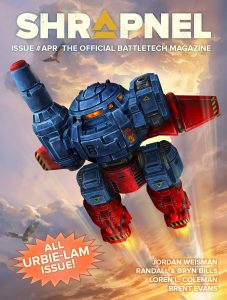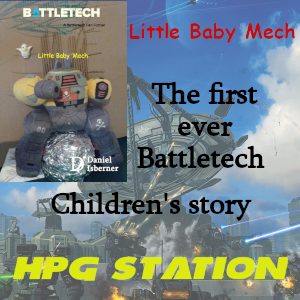Difference between revisions of "Canon"
(Very much "Work in progress" - need to get this going) |
(copyedits, additional flesh) |
||
| Line 1: | Line 1: | ||
'''Canon''', in the context of a fictional universe such as the [[BattleTech]] franchise, is the sum of all approved publications that together form and define the universe. | '''Canon''', in the context of a fictional universe such as the [[BattleTech]] franchise, is the sum of all approved publications that together form and define the universe. | ||
| − | :''The BattleTech Wiki does not seek to define what | + | :''The BattleTech Wiki does not seek to define what constitutes canon and what does not; see [[Policy:Canon]] for details. Consequently, this article makes no effort to that effect. Rather, all available information pertaining to the issue of canonicity within the BattleTech universe is collected here, to enable users of the BattleTech Wiki to decide for themselves what they regard as canon.'' |
| + | |||
==Canonicity in the BattleTech universe== | ==Canonicity in the BattleTech universe== | ||
| − | A plethora of BattleTech-related products has been released, but despite the license, the canonicity is unclear in some cases. | + | A plethora of BattleTech-related products has been released, but despite the license, the canonicity is unclear in some cases. It ultimately falls to the franchise owners to decide what is canon and what is not. |
| − | It ultimately falls to the franchise owners to decide what is canon and what is not. | + | |
| + | |||
| + | ==The difference between official products and canon== | ||
| + | Official products are defined as anything produced by or with the permission of the intellectual property owner (currently [[Topps]]). As the BattleTech universe is divided into several different (and sometimes disparate) product lines (i.e., the tabletop game, the RPG, various computer games, novels, ClickTech products, animated cartoon, etc.) that are official BattleTech products, there exists several different perspectives as to what is relevant or important (i.e., canon) from one product line to another, and how the information from each different product line influences the backstory of the lines. | ||
| + | |||
| + | Generally, the governing authority for that particular line has published (in some format) statements as to what is considered canon for that particular line. For example, in the franchise that has spawned directly from the evolving tabletop game, the various sourcebooks, novels and products are generally accepted as canon for the purposes of the backstory, with some exceptions (such as one [[Far Country|novel]] and pictures from the various products). Additionally, notice has been put out that aspects of machinery detailed in the various sources of fiction don't necessarily impact upon game rules, unless so allowed. | ||
| − | |||
==Validity of information== | ==Validity of information== | ||
| Line 13: | Line 18: | ||
===Omniscient perspective=== | ===Omniscient perspective=== | ||
| − | With the reader being | + | With the reader being addressed as a real person, and given information about the game universe in a real-world context, information presented directly from a omniscient perspective can be taken at face value. Obviously, this cannot validate information that is only indirectly related to the reader; for example, the report of a witness of the [[Phantom 'Mech]] incident presented in an omniscient source is validated insofar as that the report was made, but this still leaves it open to speculation whether or not the report as such is factually correct. |
This style is typically found in novels and comics, computer game storylines, most of the scenario books and some older sourcebooks regarding the BattleTech universe. | This style is typically found in novels and comics, computer game storylines, most of the scenario books and some older sourcebooks regarding the BattleTech universe. | ||
===In-universe perspective=== | ===In-universe perspective=== | ||
| − | Sourcebooks and other publications now usually take the form of in-universe documents, i.e. they | + | Sourcebooks and other publications now usually take the form of in-universe documents, i.e. they purport to be reports, messages etc. written by certain people or factions. As such, they exist within the universe but the information provided therein is naturally prone to inaccuracies, ignorance, bias and attempts at propaganda on the side of the alleged author. Any and all such information may thus be revealed to be misleading or outright wrong in later publications, and is not compulsory for the canonicity of the game universe. |
===Conflicting information=== | ===Conflicting information=== | ||
| + | Over the years, as the sources of material have increased, so has the complexity of the backstory. There have been noted numerous instances where statements of fact are contradicted by other sources. Where the intent to change the story is not always clear, BattleTech authorities have generally put forth the concept that the information was promulgated in-character, with the suggestion that the conflicting information was either intended as misdirection or propaganda, a matter of different perspectives or incomplete understanding of the circumstances. Speaking out-of-character, these authorities sometimes suggest the revisionist model, in which the latest work supersedes earlier material. However, the situation can be much more complicated. Oftentimes, the disparity is not addressed, leading BattleTech followers to suspect further development of the story, as pertaining to those statements. | ||
| + | |||
==Retcons== | ==Retcons== | ||
:''For a definition of the term, see [http://wikipedia.org/ Wikipedia] article: [http://en.wikipedia.org/wiki/Retroactive_continuity Retroactive continuity]'' | :''For a definition of the term, see [http://wikipedia.org/ Wikipedia] article: [http://en.wikipedia.org/wiki/Retroactive_continuity Retroactive continuity]'' | ||
| − | Although there have been | + | Although there have been retcons in the BattleTech universe, they are relatively few. Much information about the game universe is presented from an in-universe point of view; if such information is later revealed to be false it is not technically a retcon. |
| + | |||
| − | ==Non- | + | ==Non-canon== |
| + | Non-canon is generally defined as aspects of the BattleTech story, whether officially produced (or acknowledged) and then disavowed or produced by the BattleTech fandom, that do not directly relate to the current perspective of the universe's story. | ||
Revision as of 19:01, 19 July 2009
Canon, in the context of a fictional universe such as the BattleTech franchise, is the sum of all approved publications that together form and define the universe.
- The BattleTech Wiki does not seek to define what constitutes canon and what does not; see Policy:Canon for details. Consequently, this article makes no effort to that effect. Rather, all available information pertaining to the issue of canonicity within the BattleTech universe is collected here, to enable users of the BattleTech Wiki to decide for themselves what they regard as canon.
Contents
Canonicity in the BattleTech universe
A plethora of BattleTech-related products has been released, but despite the license, the canonicity is unclear in some cases. It ultimately falls to the franchise owners to decide what is canon and what is not.
The difference between official products and canon
Official products are defined as anything produced by or with the permission of the intellectual property owner (currently Topps). As the BattleTech universe is divided into several different (and sometimes disparate) product lines (i.e., the tabletop game, the RPG, various computer games, novels, ClickTech products, animated cartoon, etc.) that are official BattleTech products, there exists several different perspectives as to what is relevant or important (i.e., canon) from one product line to another, and how the information from each different product line influences the backstory of the lines.
Generally, the governing authority for that particular line has published (in some format) statements as to what is considered canon for that particular line. For example, in the franchise that has spawned directly from the evolving tabletop game, the various sourcebooks, novels and products are generally accepted as canon for the purposes of the backstory, with some exceptions (such as one novel and pictures from the various products). Additionally, notice has been put out that aspects of machinery detailed in the various sources of fiction don't necessarily impact upon game rules, unless so allowed.
Validity of information
Information is provided in different ways. While many of the earlier products were written from an omniscient perspective, recent publications tend to take the form of documents or reports from within the universe.
Omniscient perspective
With the reader being addressed as a real person, and given information about the game universe in a real-world context, information presented directly from a omniscient perspective can be taken at face value. Obviously, this cannot validate information that is only indirectly related to the reader; for example, the report of a witness of the Phantom 'Mech incident presented in an omniscient source is validated insofar as that the report was made, but this still leaves it open to speculation whether or not the report as such is factually correct.
This style is typically found in novels and comics, computer game storylines, most of the scenario books and some older sourcebooks regarding the BattleTech universe.
In-universe perspective
Sourcebooks and other publications now usually take the form of in-universe documents, i.e. they purport to be reports, messages etc. written by certain people or factions. As such, they exist within the universe but the information provided therein is naturally prone to inaccuracies, ignorance, bias and attempts at propaganda on the side of the alleged author. Any and all such information may thus be revealed to be misleading or outright wrong in later publications, and is not compulsory for the canonicity of the game universe.
Conflicting information
Over the years, as the sources of material have increased, so has the complexity of the backstory. There have been noted numerous instances where statements of fact are contradicted by other sources. Where the intent to change the story is not always clear, BattleTech authorities have generally put forth the concept that the information was promulgated in-character, with the suggestion that the conflicting information was either intended as misdirection or propaganda, a matter of different perspectives or incomplete understanding of the circumstances. Speaking out-of-character, these authorities sometimes suggest the revisionist model, in which the latest work supersedes earlier material. However, the situation can be much more complicated. Oftentimes, the disparity is not addressed, leading BattleTech followers to suspect further development of the story, as pertaining to those statements.
Retcons
- For a definition of the term, see Wikipedia article: Retroactive continuity
Although there have been retcons in the BattleTech universe, they are relatively few. Much information about the game universe is presented from an in-universe point of view; if such information is later revealed to be false it is not technically a retcon.
Non-canon
Non-canon is generally defined as aspects of the BattleTech story, whether officially produced (or acknowledged) and then disavowed or produced by the BattleTech fandom, that do not directly relate to the current perspective of the universe's story.


